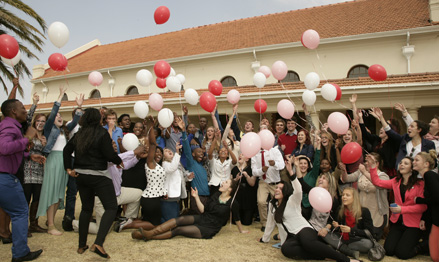Latest News Archive
Please select Category, Year, and then Month to display items
02 January 2025
|
Story Gerda-Marie van Rooyen
|
Photo Supplied
 Leading the research in South Africa is Prof Linus Franke from the Department of Soil, Crop and Climate Sciences.
Leading the research in South Africa is Prof Linus Franke from the Department of Soil, Crop and Climate Sciences.
Scientists are actively pursuing the successful breeding of diploid hybrid potatoes from inbred lines. This is expected to revolutionise potato breeding as it holds the key to rapid genetic progress. It will introduce new varieties for commercialisation through seed. Currently, existing potato variants have a gene that renders self-pollinated seeds infertile.
Prof Linus Franke, an academic in the Department of Soil, Crop and Climate Sciences at the UFS, is leading the research in South Africa. “This technology allows the production of genetically uniform potato seed that is easy to transport and largely disease-free.” He says this differs from conventional breeding whereby only vegetative propagation is possible due to tetraploid varieties in potatoes. It also risks carrying pests and diseases from one generation to the next – leading to the accumulation of pests and diseases with each round of multiplication.
Seed innovation
Prof Franke explains that Solynta BV, a seed company based in the Netherlands that produces potato varieties that can be grown from seed, has included South Africa in their research efforts because it is one of Africa’s largest producers and exporters. Through his academic relationship with Wageningen University and Research, a Dutch institution renowned for its agricultural endeavours and food production, the UFS became involved in researching hybrid potatoes grown from seed.
Diploid seeds containing two sets of chromosomes allow easier gene manipulation to increase predictability and speedier genetic progress. The breeding approach enables the incorporation of tolerance to pests, diseases, abiotic stresses (cold, heat, drought) and other desired genetic traits.
Although Prof Franke is optimistic about this research, he is not blind to disadvantages. “Potato seeds are tiny and have little energy reserves, making it harder to grow potatoes from seed than from tubers.” He says potatoes from seed will take longer to cultivate than tubers, as farmers need to grow plantlets from seeds first, adding six weeks to the growing period. “It is possible that commercial farmers can grow potatoes directly from seed. Alternatively, perhaps more likely, specialised growers will produce tubers of potatoes from seed; these tubers are then sold as seed tubers to other potato farmers, who then continue their normal practices of producing potatoes for the market from tubers.”
Financial benefits
Prof Franke says farmers have reason to get excited. “Seed potatoes will reduce input costs, as varieties with enhanced tolerance to pests and diseases require less pesticides. Planting one hectare of potatoes requires three to four tonnes of potato tubers, but only one 25 g packet of potato seeds.” Since potatoes are a more valuable commodity than maize, this technology might also increase farmers’ income potential.
‘Your capacity for change is limitless’
2013-09-13
|
 |
Ready for the world - students taking part in the 2013 Leadership for Change programme getting ready to travel to universities in the USA, Europe and Asia.
Photo: Johan Roux
12 September 2013 |
“You will change this campus, city, country, continent and the world, because you have the capacity for greatness,” Prof Jonathan Jansen, Vice-Chancellor and Rector of the University of the Free State (UFS), said.
He addressed the 2013 group of first-year students in the Leadership for Change programme at a farewell function before they will leave for universities abroad. The first 104 students from the 2013 total of 144 will depart on 18 September and return on 3 October 2013. The second group of 40 students will be abroad from 11 to 25 January 2014. The students are from the Bloemfontein and Qwaqwa Campuses. They will be accompanied by mentors from the UFS.
The students will visit 17 universities in the USA, Europe and Asia.
The first 71 first-year students in the Leadership for Change programme were sent abroad for two weeks in September 2010 to get intense exposure to the academic, social, cultural and residential lives of students in the USA. In 2011 the student number more than doubled and universities in Europe were included. In July 2012 the programme brought students from around the globe to the UFS for the Global Leadership Summit.
Prof Jansen inspired the young leaders, saying, “If you learn leadership values in your four years of study, a change will come. Build the new value system and take it into the country. Your capacity for change is limitless.”
He encouraged them to learn to know the stranger, not only abroad, but also the beggar at the street corner. “Learn to be comfortable with the beggar, as well as with the professor in the classroom.”
A stringent evaluation and training programme preceded the group’s visit abroad, and Prof Jansen could not formulate their achievement better: “I cannot tell you how proud I am of you.”